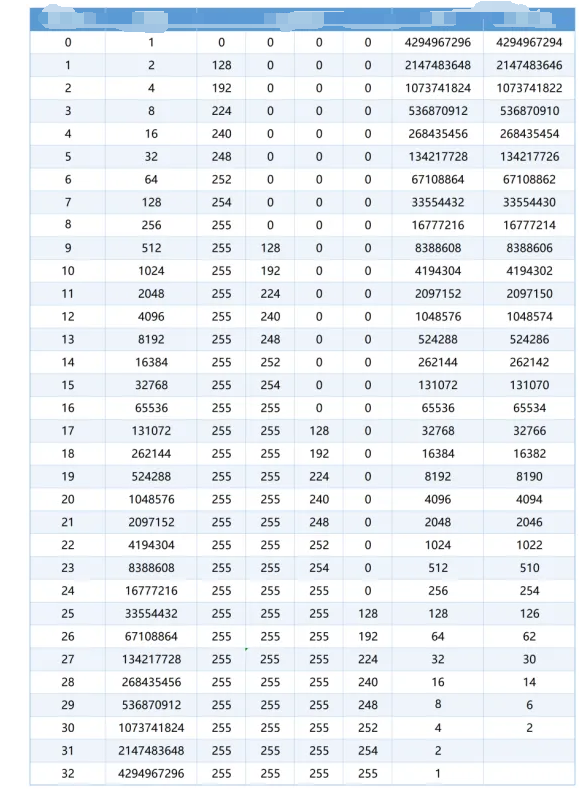Say goodbye to IP configuration rollover! IP mask corresponding table + subnet division combat, quick save!
Hey! Gentlemen, good morning, noon and good evening! It's time again for tech chatter.
What are we going to talk about today? Talk about the basic, but crucial thing - IP address and submask! Yeah, that's both of them! The source of many network failures and the culprits of many hair losses are related to the inadequate configuration of these two guys.
Someone asked me every day in the group, and I have shared it before in the Official Account message template. But there are not too many good things, so today we will give a final summary + practical cases, break up the IP and masking issues, and explain the common scheme for subnet division to you in plain English!
Dry goods alert! I recommend collecting, retweeting and sharing three times!
For more information, please scan the WhatsApp QR code below to contact customer service.

01 The length of the mask
Subnet mask, a total of 32 bits, no matter what it looks like (255.255.255 X) ,Its core function is one: to tell the device which part of the IP address is the network bit and which part is the host bit.
Here's the key: Every extra bit in the mask (longer network bits) , the number of usable host IP addresses dropsLook at this summary of the soul:

Remember this rule : the longer the mask ( the larger the number after / ) , the finer the network is divided , but the fewer people can live in each cell
02 Subnet division
What is the most commonly used subnet division of Class C address?Class C addresses (192.168.x.x, 10.x.x.x, 172.16-31.x.x) Default mask / 24 (255.255.255) ,It's like a bunk bed that can hold 254 people.
However, in actual projects, we often have to divide the bulk of the building into a subnet according to department, floor, and function. How's that between? Just use the mask!
Here are some of the most common divisional gestures:
1: The Buddhist system is not divided - / 24 (1 subnet)
Mask : 255.255.255
AvailableIP: 192.168.1.1To 192.168.1.254 (254)
Expression : 192.168.1.0 / 24
Applicable : Small office , single network segment , to save trouble
2: One slice and two halves - / 25 (divided 2 subnets)
Mask : 255.255.255 128
Subnet 1: 192.168.1.0/25 -> IP: 192.168 (126A)
Subnet 2: 192.168.1.128/25 -> IP: 192.168 (126A)
Apply to : simple isolation , such as separating the office area from visitors .
3: Quarter of the Day - / 26 (divided by 4 subnets)
Mask : 255.255.255 192
Subnet 1: 192.168.1.0/26 -> IP: 192.168 (62A)
Subnet 2: 192.168.1.64/26 -> IP: 192.168 (62A)
Subnet 3: 192.168.1.128/26 -> IP: 192.168 (62A)
Subnet 4: 192.168.1.192/26 -> IP: 192.168 (62A)
Applicable : medium-sized office divided by department ( administration , technology , marketing , server area ) .
4: The Fairy Crossing the Sea - / 27 (draw 8 subnets)
Mask : 255.255.255 . 224
Each subnet is availableIP: 30A (e.g. 192.168.1.0/27 -> 192.168 1.1 - 192.1681.30)
Other subnets are similar: .32, .64, .96, .128, .160, .192, .224The beginning.
Applicable : more precise division , such as different floors , different project groups , or dedicated to wireless AP , camera and so on .
5: Extreme segmentation - / 28 (divided into 16 subnets)
Mask : 255.255.255 240
Each subnet is availableIP: 14A (e.g. 192.168.1.0/28 -> 192.168 1.1-192.1681.14)
Other subnets: .16, .32, .48...All the way to the. 240s.
Applicable to : point-to-point links , device management addresses , or special areas where the number of devices is very small .
Priorities & a cave shelter guide:
Gateway address : Each subnet usually takes the first or last available IP as the gateway ( such as . 1 or . 254 in / 24 ) , do not set the gateway to broadcast address or network number !
Reserve address: remember to give network equipment when planning (switch, router,AP) 、Server reserved fixed IP, don't let DHCP all occupied.
Future expansion: Leave a little wiggle roomDon't put the subnet IP number card dead, in case add a printer?
VLAN is logic , subnet is IP layer : VLAN ( virtual local area network ) and IP subnet usually one-to-one correspondence , but they are different layer concept , don 't mix up .
For more IP configuration resources, follow the Facebook account & youtube account: Thinkmo Dumps


